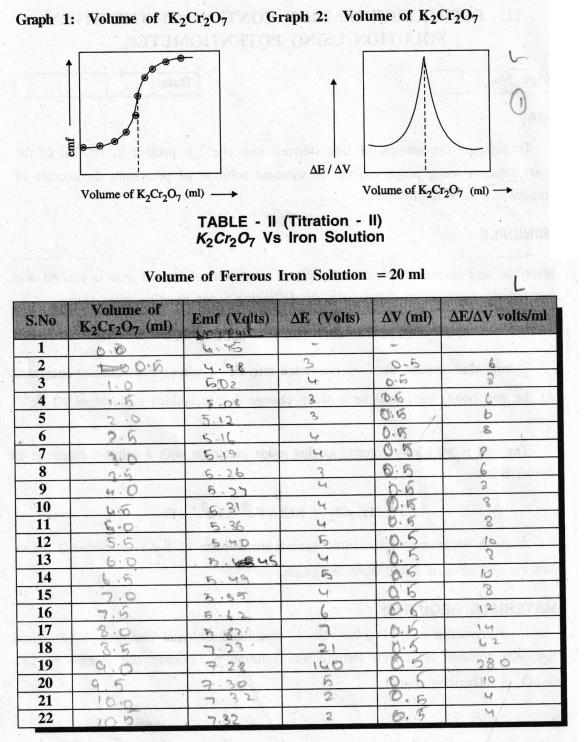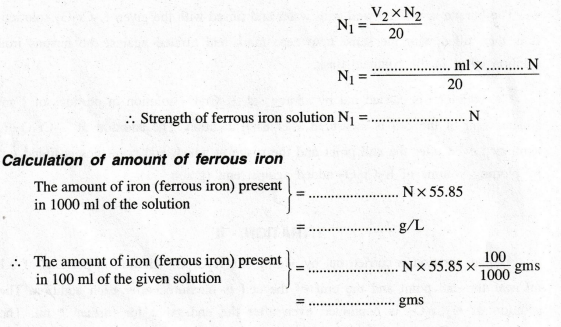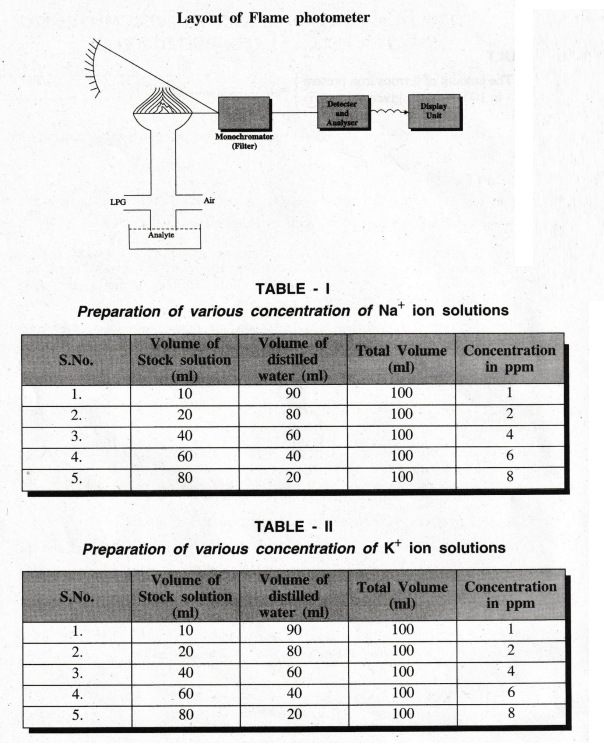Engineering Chemistry Laboratory Practical
11. Estimation of iron content of the given solution using potentiometer
Chemistry (Lab) Practical
To estimate the amount of Iron (ferrous iron (Fe2+)) present in 100 ml of the given solution using potentiometer. A standard solution of potassium dichromate of strength .......... N is provided.
11. ESTIMATION OF IRON CONTENT OF THE GIVEN SOLUTION USING
POTENTIOMETER
Expt.
No.
Date:
AIM
To
estimate the amount of Iron (ferrous iron (Fe2+)) present in 100 ml
of the given solution using potentiometer. A standard solution of potassium
dichromate of strength .......... N is provided.
PRINCIPLE
Potentiometric
titrations depend on measurement of emf between reference electrode and an
indicator electrode. When a solution of ferrous iron is titrated with a
solution of potassium dichromate, the following redox reaction takes place.

During
this titration Fe2+ is converted into Fe3+, whose concentration
increases. At the end point, there will be a sharp change due to sudden removal
of all Fe2+ ions.
The
cell is set up by connecting this redox electrode with a calomel electrode as
shown below.
Hg
/ Hg2Cl2(s) KCI // Fe2+, Fe3+ / Pt
A
graph between emf measured against the volume of K2Cr2O7
added is drawn and the end point is noted from the graph.
MATERIALS
REQUIRED
1.
Potentiometer 2. Pt electrode 3. Saturated Calomel electrode 4. Standard
K2Cr207 solution 5. Given ferrous iron solution 6. Burette and pipette 7. Dil.
H2SO4 8. Distilled water

PROCEDURE
The
given iron (ferrous iron) solution is transfered into 100 ml standard flask and
made upto the zero mark using distilled water. 20 ml of this made up solution
is pipetted out into a clean 100 ml beaker. About 10 ml of dil H2SO4
and 20 ml of distilled water are added in it. A platinum electrode is dipped
into the solution. This electrode is then coupled with a saturated calomel
electrode and the cell is introduced into potentiometric circuit.
TITRATION
- I
The
burette is washed well with water and rinsed with the given K2Cr2O7
solution. It is then filled with the same upto zero mark and titrated against
the ferrous iron solution taken in the connical flask.
The
addition is carried out by adding std. K2Cr2O7
solution in portions of 1 ml and the emf of the cell is measured after each
addition. The addition of K2Cr2O7 is continued
even after the end point and the range at which end point lies is found out by
plotting volume of K2Cr2O7 added against emf
(graph - 1).
TITRATION
- 11
Another
titration is carried out by adding std. K2Cr2O7
solution in portions of 0.1 ml near the end point and the emf of the cell is
measured after each addition. The addition of K2Cr2O7
is continued even after the end point for further 1 ml. The accurate end point
is determined by plotting ΔE/ΔV Vs Volume of K2Cr2O7added
(graph - 2). From the end point, the strength of ferrous iron solution and
hence its amount is calculated.
Step
II
Calculation
of strength of ferrous iron solution
Volume
of ferrous iron solution, V1 = 20 ml
Strength
of ferrous iron solution, N1 = ........?
Volume
of K2Cr2O7, V2 = ............... ml
Strength
of K2Cr2O7, N2 = ........ N
According
to the law of volumetric analysis V1N1 = V2N2

RESULT
The
amount of ferrous iron present in 100 ml of the given solution is = …….. gms.

Engineering Chemistry Laboratory Practical : Tag: : Chemistry (Lab) Practical - 11. Estimation of iron content of the given solution using potentiometer
Related Topics
Related Subjects
Physics and Chemistry Laboratory
BS3171 Practical Experiment 2021 Regulation | 1st Semester Common to all Dept 2021 Regulation
